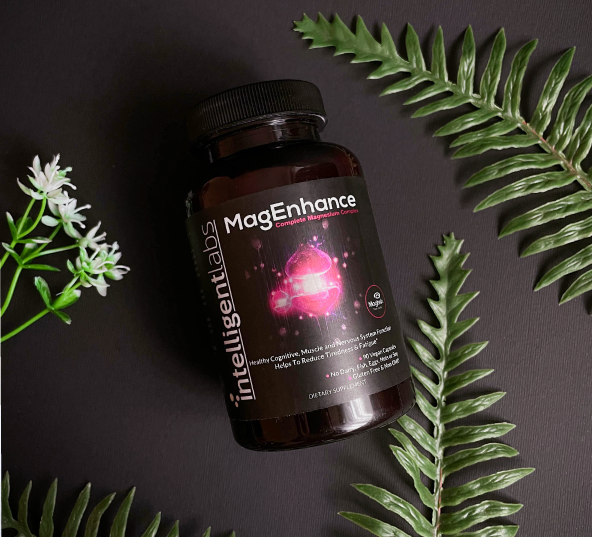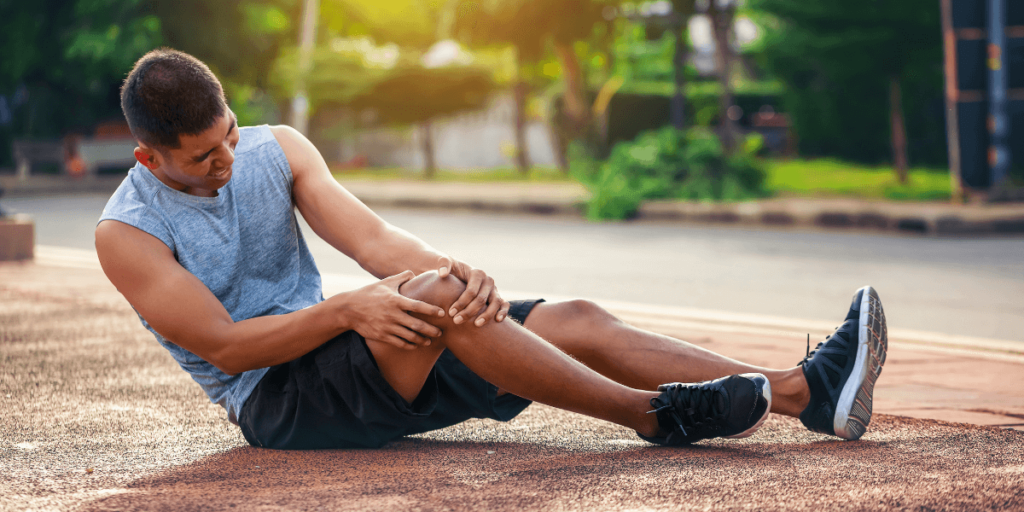Muscle cramps can be painful and unpredictable, striking during workouts, rest, or even sleep. While hydration and stretching can help, they don’t always prevent them. One key factor often overlooked is magnesium, a vital mineral that supports muscle function and recovery.
In this blog, we’ll explore how magnesium can help with muscle cramps, which types work best, and why it’s essential for both athletes and everyday fitness enthusiasts.
Table of Contents
What’s a muscle cramp? Is it the same as a muscle spasm?
Muscle cramps and muscle spasms both involve involuntary muscle contractions. But muscle spasms are usually painless and fleeting. An example would be a quick, twitching movement in the eyelids, arms, or legs.
On the other hand, true muscle cramps start from peripheral nerves, i.e. the nerves outside the brain and spinal cord. 1 They can come on abruptly and be so intensely painful that they can wake you up from sleep or render you immobile. Areas commonly affected are the calves, toes, and thighs.
When cramps occur, the affected muscles tighten or contract involuntarily. Depending on the area, you may even see the muscles visibly distorted! Fortunately, they typically last only a short time (a few minutes at most). But your muscles may remain sore long after the cramp subsides.
Here are some factors that can trigger spontaneous (ordinary) muscle cramps:2
- Muscle fatigue due to intense physical activity
- Insufficient stretching before physical activity
- Dehydration
- Electrolyte imbalance (magnesium is an electrolyte)
- Older people are more prone to cramping
- Pregnancy
Should you take a magnesium supplement for muscle cramps?
Magnesium is often part of the conversation when it comes to muscle cramp supplements. This shouldn’t come as a surprise since this mineral is involved in hundreds of biochemical reactions in the body, including muscle contraction and relaxation, and nerve signal regulation.3
But does it help with cramps? The studies below suggest magnesium may be an effective anti-cramp supplement, especially for certain groups.
Can magnesium help prevent cramps in pregnant women?
Yes, there is evidence that taking a magnesium supplement during pregnancy may help reduce muscle cramps.
A literature review that examined 7 studies (3 of which were focused on pregnant women) reported that everyone who took magnesium experienced fewer cramps than those who didn’t. However, it was the studies on pregnant women that showed significant improvements in cramp frequency and intensity.4
Another study reported similar outcomes, highlighting magnesium’s effectiveness in this demographic. Pregnant women who had leg cramps at least twice a week experienced a significant reduction in cramp frequency and intensity after taking 300mg of magnesium for 4 weeks.5
Can magnesium help prevent nocturnal leg cramps?
As the name suggests, nocturnal leg cramps happen at night. It affects about 37% of Americans over 60, primarily impacting calf muscles. The exact cause is unclear, but some probable causes include heavy physical work, standing for long periods, nerve compressions, hormonal issues, and medications.6
A recent study conducted in the Ukraine tested the effectiveness and safety of magnesium in treating nocturnal leg cramps. 175 subjects aged 45 and above completed a 60-day trial. Results showed that those who took magnesium experienced a more significant decrease in the frequency and duration of leg cramps than the placebo group. The magnesium takers also enjoyed improved sleep quality.7
Can magnesium help prevent exercise-related cramps?
This type of cramp often happens during or after physical activity, like strength training or cardio exercises. The most probable causes include dehydration, electrolyte imbalance, and muscle fatigue. A newer theory also suggests temporary nerve control issues may be behind this type of cramp.8
That said, the jury’s still out on magnesium’s effect on exercise-related cramps due to the lack of studies on this subject.9
Can magnesium help with athletic recovery?
Magnesium is essential for strength training and athletic performance. It activates ATP, the body’s primary energy molecule, and helps maintain electrolyte balance. Studies indicate that even a mild magnesium deficiency can negatively affect physical performance, increase inflammation, and slow recovery.10
For athletes and fitness enthusiasts, including those involved in weight lifting, magnesium is particularly crucial since it’s lost through sweat. Research has found that magnesium supplementation can enhance endurance, power output, and recovery. For example:
- Triathletes supplementing with magnesium for four weeks improved their swim, bike, and run times. They also had lower stress and inflammation levels.11
- A study on professional volleyball players found that those supplementing with magnesium increased their jump height. They also had lower lactate levels, indicating better energy use.12
Is MagEnhance the best supplement for muscle cramps and exercise recovery?
Our MagEnhance Magnesium Complex is designed to boost magnesium levels in the body, potentially preventing cramps and enhancing muscle recovery. MagEnhance features 3 types of magnesium. These are:

Magnesium L-Threonate – scientists from top universities developed this form of Magnesium to specifically cross the blood-brain barrier. This form directly increases magnesium levels in the brain, helping to improve memory and reduce the severity of migraines and headaches.
Magnesium Glycinate – while this form can’t cross the blood-brain barrier, this is the most absorbable form of Magnesium. Adding this to MagEnhance helps ensure you get adequate amounts of this mineral for whatever your body needs it for.
Magnesium Taurate – this is a mixture of magnesium and the amino acid, taurine. Both compounds act on the GABA receptors in the central nervous system, which produce feelings of calm and relaxation. It also helps improve sleep quality.
How much MagEnhance should you take each day?
The standard dosage is 3 capsules a day. This is sufficient to correct a magnesium deficiency and maintain healthy levels in the body to help all areas of your health. However, if you have more severe symptoms you need to treat, you may go up to 6 capsules a day, but please don’t exceed this.
Overdosing on magnesium typically causes mild issues like diarrhea, which healthy kidneys can handle. However, upper intake limits vary, so stick close to recommended amounts. Also, consult a doctor before significantly altering your magnesium intake.
When to seek medical attention for muscle cramps?
While there is evidence that supports magnesium’s preventive effects on cramps, seeking medical attention may be necessary when they occur regularly and for prolonged periods. Your doctor may review your medical history, do a physical check-up, and run a few tests to help figure out the cause.
Conclusion
MagEnhance may be an effective supplement for muscle cramps and post-workout recovery. However, individual responses can vary, and it’s not a one-size-fits-all solution. Factors like diet, hydration, and exercise also play vital roles in muscle health. So, before you take any muscle cramp supplement, please do consult your doctor.
💬 Join the Conversation! Have you tried magnesium for muscle cramps or recovery? Share your experience in the comments below!
📩 Want more expert-backed health tips, exclusive offers, and the latest supplement news, sign up for our mailing list today!
References:
- Miller, Timothy M., and Robert B. Layzer. “Muscle Cramps.” Muscle & Nerve, vol. 32, no. 4, 2005, pp. 431–442, https://doi.org/10.1002/mus.20341. ↩︎
- Stern, Lawrence Z., and Charles Bernick. “Muscle Cramps.” PubMed, Butterworths, 1990, www.ncbi.nlm.nih.gov/books/NBK376/. ↩︎
- Zhang, Yijia, et al. “Can Magnesium Enhance Exercise Performance?” Nutrients, vol. 9, no. 9, 28 Aug. 2017, p. 946, www.mdpi.com/2072-6643/9/9/946/htm ↩︎
- Sebo, Paul, et al. “Effect of Magnesium Therapy on Nocturnal Leg Cramps: A Systematic Review of Randomized Controlled Trials with Meta-Analysis Using Simulations.” Family Practice, vol. 31, no. 1, 1 Feb. 2014, pp. 7–19, pubmed.ncbi.nlm.nih.gov/24280947/ ↩︎
- Supakatisant, Chayanis, and Vorapong Phupong. “Oral Magnesium for Relief in Pregnancy-Induced Leg Cramps: A Randomised Controlled Trial.” Maternal & Child Nutrition, vol. 11, no. 2, 22 Aug. 2012, pp. 139–145, https://doi.org/10.1111/j.1740-8709.2012.00440.x. ↩︎
- Bordoni, Bruno, et al. “Muscle Cramps.” PubMed, StatPearls Publishing, 2023, www.ncbi.nlm.nih.gov/books/NBK499895. ↩︎
- Barna, Olha, et al. “A Randomized, Double-Blind, Placebo-Controlled, Multicenter Study Assessing the Efficacy of Magnesium Oxide Monohydrate in the Treatment of Nocturnal Leg Cramps.” Nutrition Journal, vol. 20, no. 1, 31 Oct. 2021, https://doi.org/10.1186/s12937-021-00747-9. ↩︎
- Jahic, Dzenan, and Edin Begic. “Exercise-Associated Muscle Cramp-Doubts about the Cause.” Materia Socio Medica, vol. 30, no. 1, 2018, p. 67, https://doi.org/10.5455/msm.2018.30.67-69. ↩︎
- Garrison, Scott R, et al. “Magnesium for Skeletal Muscle Cramps.” Cochrane Database of Systematic Reviews, 21 Sept. 2020, https://doi.org/10.1002/14651858.cd009402.pub3. ↩︎
- Nielsen, F H, and H C Lukaski. “Update on the relationship between magnesium and exercise.” Magnesium research vol. 19,3 (2006): 180-9. ↩︎
- Golf, S W et al. “On the significance of magnesium in extreme physical stress.” Cardiovascular drugs and therapy vol. 12 Suppl 2 (1998): 197-202. doi:10.1023/a:1007708918683 ↩︎
- Setaro, Luciana et al. “Magnesium status and the physical performance of volleyball players: effects of magnesium supplementation.” Journal of sports sciences vol. 32,5 (2014): 438-45. doi:10.1080/02640414.2013.828847 ↩︎




